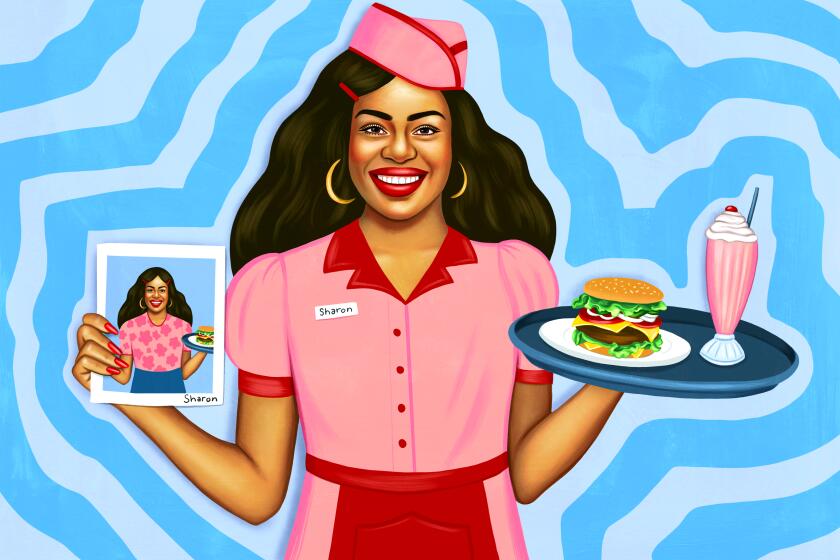Explaining Hollywood: How to get a job as a TV writer

Television writer Lucas Brown Eyes moved to California from rural South Dakota when he was 13. He came from a 10-person family, but a tragedy tore his family apart. By the time it was just him and his mom living in a friend’s basement, she asked him where he wanted to go if they could start over.
He said Hollywood. They moved to Santa Ana — close enough. And on the day they arrived, before they had time to find a hotel, his mom had a job interview and he had an audition for the Orange County School of the Arts.
They told him he needed a script. He didn’t know how to write a script. His mom told him, “We’re Lakota. We don’t give up without a fight.” They went to the library, and he wrote it in about four hours. His mom pawned some of her jewelry to buy a video camera so he could shoot an audition video.
He got in.
Brown Eyes — who has written for shows including “Young & Hungry,” “K.C. Undercover” and “Alexa & Katie” — considers that the beginning of his path to becoming a television screenwriter. But there’s no one path, he said.
Early on, Brown Eyes only saw two Native screenwriters in the industry. They both came from the Walt Disney Television Writing Program, so he applied and got in.
“I feel like when people read about how to make it, or how to do something, they read a person’s path and think. ‘I gotta do that,’” he said. “And they put a lot of pressure to do that. But that path might not be right for you.... Maybe there’s a better option.”
As you consider your options for how to start or move up as a TV writer, you’ll need to build a portfolio and a community of writers around you. You’ll also need to understand the various career paths and jobs along the way. Brown Eyes and fellow TV writers Tze Chun and Gennifer Hutchison explain what you need to know.
We Can Teach You That
How to build a career in Hollywood
Join Times reporters Anousha Sakoui and Wendy Lee, as well as Bree Frank, vice president of physical production for unscripted TV at Hello Sunshine, and Phillip Sun, the president and co-founder of the management company M88, for a virtual webinar on careers in the entertainment industry. We’ll discuss the state of Hollywood jobs, how aspiring entertainers can get a foot in the door, and take your questions.
When: Tuesday, Aug. 10, 6 p.m. Pacific time
Cost: $10 for Times subscribers; $20 for non-subscribers
Tickets: Sign up on Eventbrite
What’s on your mind? Please let us know in advance of Aug. 10 about your interests and most pressing questions about working in Hollywood. Share your questions here.
Who becomes a TV writer?
The main draw of pursuing writing for television over film is that TV is a writer’s medium, whereas film is a director’s medium, where the script is considered more of a blueprint than a bible. The promise of being a TV writer is that when you work your way up and eventually become a showrunner, you will have creative control of your project.
There are also clearer pathways in television writing that makes it appear to be more of a straightforward route compared to other gigs in the industry, though it continues to be competitive with no guarantees.
How do you get started?
There are many ways, but three common ones are:
- starting out as an assistant;
- being accepted into a TV writing program;
- getting noticed for your own independent work.
“All of this is kind of winning the lottery,” Brown Eyes said. He was one of eight people accepted to the Disney program. He remembers that 2,000 applied.
Chun — who wrote for “Gotham” and is an executive producer and writer for two upcoming projects: “Gremlins: Secrets of the Mogwai” and “I’m a Virgo,” a collaboration with Boots Riley and Jharrel Jerome — made a name for himself in independent filmmaking with his films “Children of Invention” and “Cold Comes the Night” before crossing over to television. Making a web series can also be a good calling card, Brown Eyes said.
Hutchison’s first job out of college was as an office production assistant on “Nash Bridges.” A production coordinator was recruiting recent graduates from her university in San Francisco. From there, she became a production assistant in the writer’s office at “The X-Files” and continued to move up. She won two Writers Guild of America Awards for her work on “Breaking Bad” and is now an executive producer of “Better Call Saul” and the upcoming “Lord of the Rings” series.
She said that the question she gets most is: How do I get a writer’s assistant job?
“And it’s hard because I do not have a good answer to it,” she said.
Those jobs don’t always get publicly listed, she said, so she encourages cold-calling offices to ask and perhaps be put on a list for when there is an opening. She added that whenever she was unemployed, she’d reach out to everyone she knew and tell them she was looking.
“That’s how I got every subsequent job,” she said.
But no matter what job path you pursue, what matters is your portfolio.
“I always say, making it is talent, preparation and luck,” said Hutchison. “And you cannot control the luck part. You can only control developing your craft and making sure you have those scripts ready to read when someone says, ‘Hey, I want to read you.’”
There are two types of scripts you need in your portfolio:
- Original sample script: This is your own original TV pilot. Write your passion, the stories you want to tell — they will come out better, Brown Eyes said. “When you’re done, do another one because it doesn’t hurt to have multiple ones,” he said. He has samples for a kid’s show, a raunchy comedy and a horror show. “If you can show you have range as a writer, that’s helpful.”
- Spec script: This is where you write in the style of another television show. Use a current show that you know very well and feel as though you could get staffed for, Brown Eyes said. He thinks that spec scripts are going out of fashion, but he always suggests writing one because it makes you a better writer. And then you have it if you need it.
Chun said that he wrote four pilots before he sold one. He said it took him two years to get staffed on a TV show. “It’s a numbers game, so you just have to keep trying until there’s something that people say yes to,” he said.
An agent is not required to get a television job. However, many writers eventually hire a team of representatives once they are staffed to help them negotiate their contracts and book their next gigs.
What are the paths you take once you get going?
Though it’s very competitive to get your first job as a TV writer, once you do, there is a hierarchy — and paths forward.
All of these are writing positions, and this progression is a common way people move up the ladder:
- Staff writer
- Story editor
- Executive story editor
- Co-producer
- Producer
- Supervising producer
- Co-executive producer
- Executive producer
- Showrunner
With the exception of the showrunner and executive producers, all these jobs are similar: Everyone is a writer. Typically, television scripts are outlined as a group before being assigned to individual writers. After the draft is written, everyone continues to give notes and it’s a collaborative process.
The idea is that you move up the hierarchy each year, but with some shows less likely to be picked up for multiple seasons, sometimes you’re required to repeat a step if you move to a new show.
For many people who pursue entertainment as a career, it takes years to get yourself to where you are making money from your creative work. For making money in the meantime, there’s always waiting tables. But more and more people are turning to platforms like TikTok, Twitch and Patreon.
How do you make money (and what kind of money)?
“Most artists don’t like talking about money because they think it’s tacky or it pollutes why they’re doing something,” Chun said. “But at the same time, on the other side of the table — business affairs, producers, studios — they’re using that to their advantage.”
So he likes to give younger writers a road map of what they can expect while pursuing a career as a TV writer.
It could take years to get staffed, he said. But when you do, the first year, you make about $3,500 a week. As a second-tier story editor, you’re up to $6,000 a week. Every year, you get a bump as you move up a level. (Exact pay will vary depending on the type of production and is spelled out in the Writers Guild of America contract.)
“As general rule of thumb, if you can staff for eight to 10 months out of the year, whether it’s one long network season or two shorter seasons for streamers, you’ll make between $100 to $150K as a first-year, $250 to $300 [thousand] in your second year, depending on how many episodes you write. And it’ll grow from there,” he said.
After you get your first deal and cross the first couple levels, you can negotiate getting paid above scale. This is when hiring representation (an agent, manager or lawyer) may come in handy.
In the beginning, Chun said, you have to take what comes your way. But eventually you can pick and choose things that are creatively compelling and worry less about your finances.
The first step in your Hollywood career shouldn’t be paying L.A. rent. Here’s how to take your first steps toward a career in the entertainment industry, according to experts.
How is this career different than it was 10 or 25 years ago?
You still need to make friends and connections, Hutchison said. Look up local meetups, events, panels and organizations. You can start your own writing group or join an existing one. But in addition to in-person socializing, there are many more ways to meet people and get noticed.
Social media, especially Twitter, has helped. Hutchison said there’s a large network online of established and #PreWGA writers who are trying to get staffed and get writer’s assistant jobs.
“What happens is a lot of writers give a lot of advice; a lot of us do Q&As regularly,” she said. “So my advice to people is to just be on Twitter and just follow as many TV writers as possible.”
Chun found a social media community by being outspoken on Twitter about issues of diversity and inclusion. He often posts advice and signal-boosts other Asian American creatives.
“I spent years trying to figure out those things, and I felt that if I could demystify the process in some ways, it would benefit people who were coming up,” he said. “Sometimes a thread on Twitter or a one-hour phone call might have saved me a year or two of my life going down the wrong path.”
But one golden rule remains the same, no matter whether you’re making connections in person or virtually, said Hutchison: Be friendly to everyone, especially those at your same level.
“All the people I was assistants with coming up, they’re all writers now, and we support each other,” she said.
Rejection and uncertainty are part of working in Hollywood, but joy, creativity and fun can be too. Here’s how to manage your mental health.
What advice do pros always hear that’s wrong?
Sometimes people give writing advice that establishes hard rules like “never use voice-over” or “always put in something that redeems a character,” said Brown Eyes. But there are no hard rules that dictate writing.
Hutchison advised up-and-comers to take any advice with “never” or “always” with a grain of salt.
“There are industry standards — structure, page counts, etc. — that are important to know in general, and then there are ‘rules’ about style that get passed around a lot that are more bendable,” she said. “That said, know the rules before you break them so you are breaking them with intention and purpose.”
The first step in your Hollywood career shouldn’t be paying L.A. rent. Here’s how to take your first steps toward a career in the entertainment industry, according to experts.
What’s some good advice?
In 2017, Brown Eyes sold a pilot based on the story of his family moving to Southern California. It was the first Native family sitcom in development, but it was not picked up to series.
But he said that even if you don’t want to turn your life into a screenplay, it’s important to know how to tell your story.
That’s because the very last step before you find out whether you get a job is the meeting with the showrunner. At that point, the person has seen your resume, presumably likes your work and thinks you can do the job, he explained. So now all that’s left is to meet you and understand what you can bring to the writers room.
That’s when Brown Eyes retells his story about his magical day getting into Orange County School of the Arts. But he continues his life story: “Nothing means anything unless you have your family there. And that means your whole family.”
He talks about how a series of inconveniences (his brother got chased off the reservation, a tree fell on his aunt’s house) ended up being the coincidences he needed. They brought the rest of his family to Southern California after six months. “And I’d like to say that my family is like the Lakota spirit. You can knock us down, but you can’t keep us there.”
Know the emotional journey of the story of you, he said. What is your lived experience, and how will that be a unique asset on the show?
“That’s the final story that gets you in,” he said. “When you figure out your story, you’re also proving that you know story.”
Read more of The Times’ guide to working in Hollywood.
More to Read
Inside the business of entertainment
The Wide Shot brings you news, analysis and insights on everything from streaming wars to production — and what it all means for the future.
You may occasionally receive promotional content from the Los Angeles Times.










